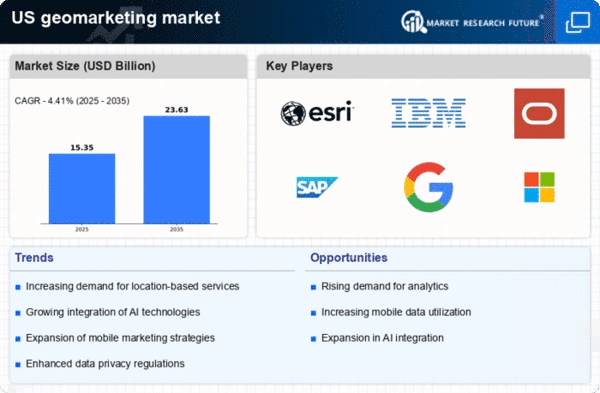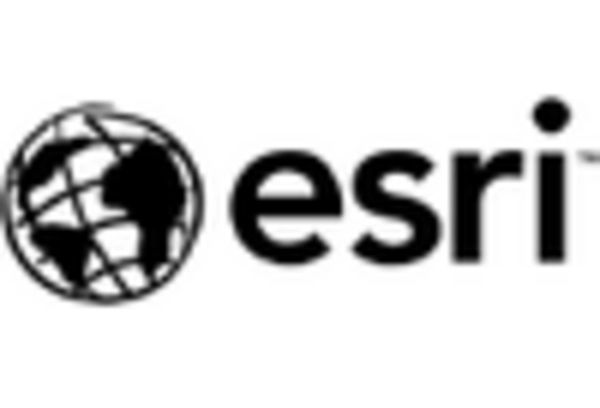Emergence of Smart Cities
The emergence of smart cities plays a pivotal role in shaping the geomarketing market. As urban areas increasingly adopt smart technologies, the demand for location-based services rises. In 2025, investments in smart city initiatives in the US are projected to exceed $100 billion, creating opportunities for geomarketing solutions. These initiatives often involve the integration of IoT devices, which generate vast amounts of location data. Businesses can leverage this data to enhance their marketing strategies and improve customer experiences. Consequently, the geomarketing market is likely to benefit from the growth of smart cities, as organizations seek to capitalize on the insights derived from urban data.
Rising Demand for Targeted Marketing
The geomarketing market experiences a notable surge in demand for targeted marketing strategies. Businesses increasingly recognize the value of location-based insights to tailor their marketing efforts. In 2025, it is estimated that targeted marketing will account for approximately 60% of total marketing expenditures in the US. This shift is driven by the need for personalized customer experiences, which are facilitated by geomarketing tools. Companies leverage geographic data to identify consumer behavior patterns, enabling them to optimize their advertising campaigns. As a result, the geomarketing market is likely to witness substantial growth, as organizations seek to enhance their competitive edge through precise targeting.
Advancements in Geospatial Technology
Technological advancements in geospatial tools significantly influence the geomarketing market. Innovations such as high-resolution satellite imagery and real-time data analytics empower businesses to make informed decisions based on geographic information. In 2025, the market for geospatial technology is projected to reach $100 billion in the US, reflecting a robust growth trajectory. These advancements facilitate the integration of various data sources, allowing companies to analyze consumer behavior and market trends more effectively. Consequently, the geomarketing market is poised for expansion as organizations adopt these cutting-edge technologies to enhance their marketing strategies.
Growing Importance of Mobile Marketing
The geomarketing market is increasingly shaped by the growing importance of mobile marketing. With the proliferation of smartphones, businesses are leveraging location-based services to engage consumers in real-time. In 2025, mobile marketing is expected to represent over 50% of total digital marketing spending in the US. This trend underscores the necessity for companies to adopt geomarketing strategies that cater to mobile users. By utilizing location data, businesses can deliver personalized offers and promotions, thereby enhancing customer engagement. As mobile marketing continues to evolve, the geomarketing market is likely to experience significant growth driven by this shift.
Regulatory Changes and Compliance Needs
Regulatory changes and compliance needs significantly impact the geomarketing market. As data privacy regulations evolve, businesses must adapt their marketing strategies to ensure compliance. In 2025, it is anticipated that 70% of companies in the US will prioritize data protection measures in their geomarketing efforts. This shift necessitates the implementation of robust data management practices, which can influence marketing effectiveness. Companies that successfully navigate these regulatory landscapes are likely to gain a competitive advantage. Thus, the geomarketing market is expected to evolve in response to these compliance needs, driving innovation in data handling and marketing practices.

















